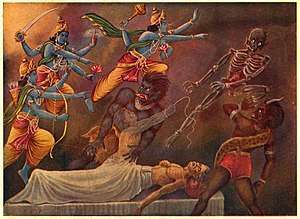Ajamila
Ajamila (Sanskrit: अजामिल) is the main character of a story in canto 6 of the Bhagavata Purana.[1] In Hinduism, the story of Ajamila is used to illustrate that by uttering God’s divine name, there is hope for even the sinful to be redeemed from their propensity to commit sins.[2]

Life
Ajamila was raised according to the Vedic regulations. He was a perfectly trained Brahmin and had a beautiful wife.
But one day, while he was out in the fields collecting flowers for worshipping the Lord, he happened to see a drunken sudra and a prostitute engaged in sexual embrace. Ajamila became bewildered and attracted; his mind becoming more and more attached to the prostitute. Although Ajamila was a strict Brahmin he became helplessly entangled by seeing a man and woman engaged in sexual activity. Consequently he took this prostitute into his home as a maidservant. Inevitably, he became so entangled that he abandoned his family, wife and children and went off with the prostitute. Due to his illicit connection with the prostitute, he lost all his good qualities. He completely forgot his values, and indulged in sinful life.
As a result, he had children with "then-prostitute" and in serving his woman and children, he neglected devoting time to the God. But, due to his past moral values and devotion to the God, Ajamila was capable of seeing Yamadutas - the servants of Lord Yama (the god of death in Hinduism), when they arrived to take out his soul. He was so into his family, that even in his death bed, he called out to his son, whose name was Narayana, instead of praying to God. (Narayana is another name of Lord Krishna). Lord Krishna appeared at that instant and took Ajamila with him, cleansing him off his sins in his life. Although Ajamila did not devote his life to prayer, he was purified from all his sins because at the last moment he chanted the holy name of Krishna, Narayana.[3]
The story promises that the Lord is waiting for man to call for him. Even an innocent utterance of His name is enough for Him to lend helping hands to man.[4]
See also
References
- "Srimad Bhagavatam Canto 6". vedabase.net. Retrieved 2019-11-28.
- "Taraka Mantra". The Hindu. 2016-05-04. ISSN 0971-751X. Retrieved 2019-11-28.
- Gopal, Madan (1990). K.S. Gautam (ed.). India through the ages. Publication Division, Ministry of Information and Broadcasting, Government of India. p. 64.
- "Potency of Lord’s names". The Hindu. 2009-11-24. ISSN 0971-751X. Retrieved 2019-11-28.